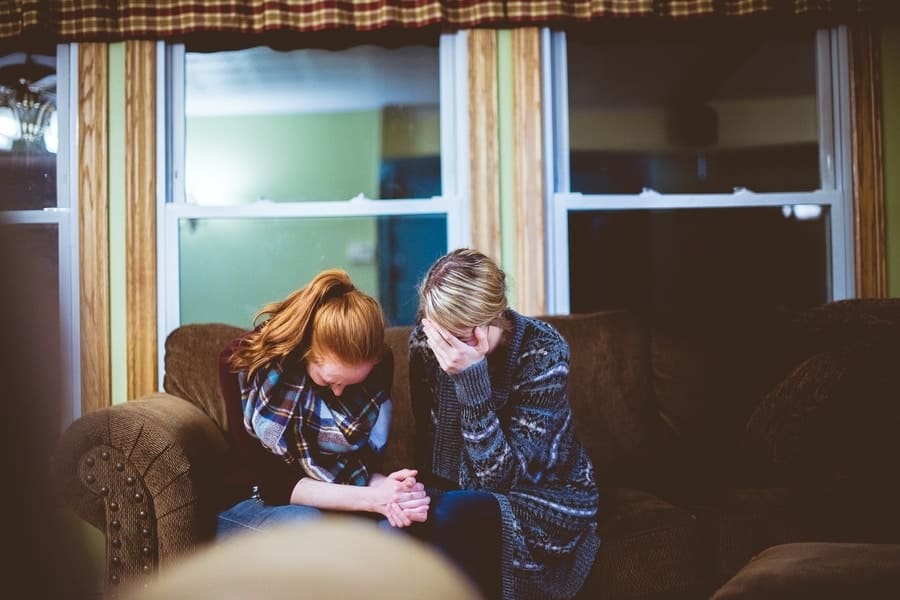Grief is a lengthy process, which is why you will often here people saying about grief coming in waves. As time goes on, the grief will lessen, coming back in waves. Much like surfing, you have to ride the wave of grief until the next break. The important thing to understand about grief is that there will be a break.
Grief is different for everyone, as much as talking about it can help, not everyone will deal with the emotions in the same way. It can be difficult to predict how someone will handle grief, but it is very likely it will come at them in waves.
Waves that will knock you over and make you feel like you can’t get back up. But slowly you will feel better and stronger. Each time you get knocked down and you feel like you can’t take any more, you will be able to battle the waves more each time.
Why Does Grief Come In Waves?
Grief is a lot of emotion for our brains to process. This is why people say they feel numb after learning terrible news. Unexpected death or loss can be too much for a person’s emotions, thoughts, and feelings to deal with.
For some time after you learn about a loss, it may seem unreal. You may frequently forget that person is no longer around. You may find yourself calling them, buying gifts for them, or talking about them in the present person.
There is no way to handle grief, even when you know it is coming. There is no way to realistically prepare for grief, even with therapy, talking to medical professionals or reading up on the topic. Like many things in life, we will only know how we will deal with grief when we are faced with it directly.
Because everyone grieves differently, don’t hold anyone to your expectations of grief, and they should avoid doing the same to you. Also, remember that talking about grief can make others feel uncomfortable. Grief is messy and complicated, so always take on the support of others.
Grief changes who you are, as you ride every wave, you will become a different person. Adjusting to a world without someone important to you can be difficult, and sadly, there are no quick fixes.
What Happens During These Waves?
When a big loss happens, it is extremely common to experience anxiety and other mental health issues. If you have recently lost someone, it is normal to suffer one or more of these issues:
- Excessive worrying
- Racing thoughts
- Tension
- Racing heart
- New phobias
- Extreme tiredness
While these are normal feelings after suffering a loss and can be self-managed, if you find it has started to affect your daily life too greatly, please seek help. This could be medical assistance or a grief councior. Please remember, although grief will ease over time, you should not be afraid to ask for help.
What Are The Waves Of Grief?
Healing is not a linear process. You can go back and forth in your grief as you ride the waves. Unfortunately, it is not a process that only goes forwards, you can always go backwards and that is okay because you will still find growth in the process.
The normal stages of grief will include periods of numbness, sorrow, guilt, and anger. These are normal sentiments you will need to process and work through as you ride the waves of grief. These emotions will subside as time goes on.
The complicated thing about grief is that you will need to move through daily life with it lurking at the back of your brain. You will likely be able to keep to your routine as you are experiencing in waves of grief. You will still feel it, but it will not stop you going to work and doing basic tasks.
Here are some symptoms associated with grief that will get better with time but are unpleasant to deal with. Grief is complicated and comes with a barrel of emotions that can come at different times or all at the same time.
- Inability to enjoy life
- Intense sorrow
- A struggle to focus
- Issues accepting the loss
- Problems accepting death
- Feelings of numbness
- Bitterness
- Hopelessness
- Struggle to do basic tasks
- Isolating from loved ones
- Blaming yourself for the death
- Wishing you had died too
- Feeling guilty for surviving
There isn’t a definitive answer to what causes grief and why it can be so complicated. Grief is multifactorial. The level of grief you will feel and how complicated it is may depend on certain factors, like who the person was to you, the circumstances around their death, your history of mental health and your support system.
What Can Trigger Grief?
The smallest thing can trigger waves of grief. And it’s totally okay that your grief has triggers. A common trigger is seeing something that reminds you of them, whether it is an item that belonged to them, a location, or even a song. When a wave of grief is triggered, you may have the following behaviors:
- Problems falling asleep or not being able to sleep through the night
- Undereating or overeating
- Forgetting things
- Spacing out
- Wanting to be alone rather than with friends or family
- Dreaming of the person you lost
- Forgetting they are gone
- Restless hyperactivity
- Crying uncontrollably
- Visiting places that you associate with the person you are grieving
Read More: Seeing a Dead Person Alive in Dream Meaning
How Do You Ride the Waves of Grief?
The waves will come, there is no escaping this process, but there are some things that you can do to get you through it with as much ease. Here are some tips to how to cope with waves of grief, it is important on how to take care of yourself throughout the waves.
- Eat regularly
- Get plenty of rest
- Lean on your support system
- Don’t be afraid of your feelings
- Read about other’s experiences
- Find your own coping mechanisms
- Don’t be afraid to fail
It can be challenging to navigate waves of grief. It may a trial-and-error process for you to understand how to best cope. Not everything will be comforting to everyone, if something a friend recommends doesn’t work for you, that’s okay. Remember, everyone deals with loss in a different way.
Talk through the process, either with a professional or with loved ones. Write down and journal your thoughts, it can be cathartic and will allow you process grief personally. Remember, this process is a marathon, not a sprint, so give yourself some grace.
Remember to get the help you need to and it’s not weak to ask for assistance. Asking for help takes a great deal of strength. If grief is left untreated and undealt with, it can turn into depression or anxiety. This can make grief more complicated and could prolong the waves.
Waves of grief could come on at any time without warning. Grief takes a lot of time, there is just no way to cut the process short and speed it up. You also can’t get all your grieving done in one go, it will naturally come in waves. Over time, the waves will get smaller and further apart.


